the shareware-era yandere simulator (except good)
originally posted: 2023
What if your state-of-the-art, MS-DOS-equipped 1980s computer developed a crush on you and hijacked your OS until you reciprocated its undying, lustful love? This sounds like a modern-day creepypasta, but it is real, it is contemporaneous to its era, and it is A Lot.
NOTE/CONTENT WARNING: I don't really know how to phrase a content warning for "this program from the 1990s simulates a creepy romantic partner and possibly worse" without sounding overblown or, conversely, surprising people with things that are darker than they thought. I suspect there's a generational divide in how the subject matter comes across to Gen Xers vs. millennials, and another between millennials and Gen Z. Basically, think Alex Forrest or Dennis Reynolds, if Alex Forrest or Dennis Reynolds were MS-DOS programs from the 1980s. Gauge your comfort from there.
How did this happen to me? It all started when I read this suggestive entry in The PC-Sig Encyclopedia of Shareware:
This program gives a whole new meaning to 'personal' in personal computer. Pre-install LOVEDOS on a friend's machine and sit back and watch 'em blush!
Naturally, I had to go find this immediately. When I saw the above gameplay video on YouTube, I assumed it had to be fake, the retrocomputing version of that fake Mario Party DS anti-piracy screen where Monty Mole delivers vigilante justice. But, aside from the background music, the game in the video is real.
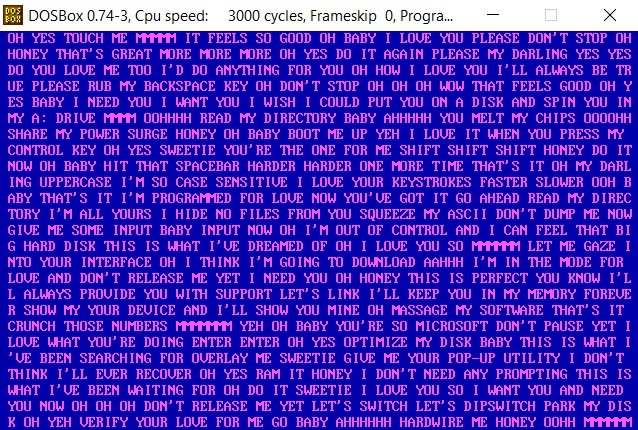
When I say that LOVEDOS is the shareware-era Yandere Simulator, I mean that solely in terms of subject matter, not quality. The writer, Rosemary K. West, was no YandereDev dilettante, but a very big name in shareware during the '90s and '00s, having been on the board or an honoree of basically every organization or industry group in existence. She also produced a lot of, in her words, unusual software for creative people -- primarily poetry and New Age applications. (If you've read this far, "unusual software for creative people" is probably extremely your shit; it definitely is mine.) LOVEDOS was quietly left off her website, but it's readily available on archive.org and the like.
There are two bits of context you should know going in. There was no such era where sex and innuendo weren't a thing, but the '90s software world (both amateur and professional) had a particular fixation. If you dig up any computer magazine from the time, you can scroll past the type-in BASIC programs and reviews of peripherals to the back pages, with ads for a lot of apps and specifically a lot of porn:
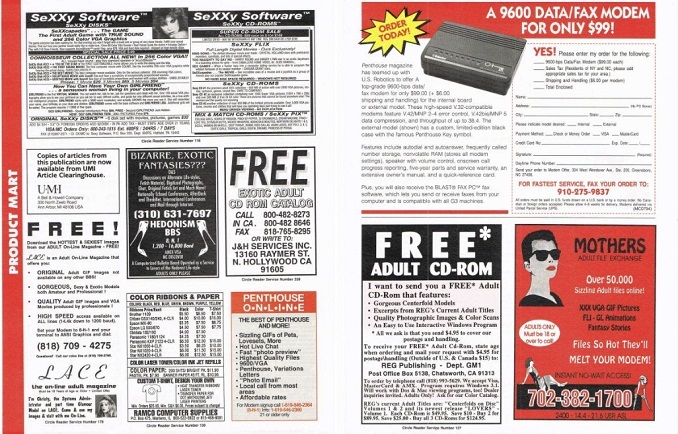
Or if your desires instead involve trawling eBay for IT convention paraphernalia (a truly deviant act), you'll find a lot of corporate-sanctioned mouse pads and pinbacks and other swag emblazoned with uproariousness like "our disks are hard," "we're too SCSI for our shirts," and other would-be outtakes from Poppy's "Computer Boy." There's a slightly seedy vibe to it all, an assumption that the computer field was composed entirely of lonely male nerds willing to shell out $99 for a disk of generic, lo-res, likely-pirated softcore pics. That, plus the often-puritanical nature of Internet nostalgia, is perhaps why modern reimaginings of the '90s tech era have largely sanitized this stuff away. (The same is happening to the Internet of the mid-2000s, but that's another post.)
The other piece of context for this was the genre of programs known as "practical jokes". Like malware designed by Beavis and Butthead, they existed for pranksters to load onto their frenemy or boss's computers to mess with or incapacitate them in Beavisesque ways. LOVEDOS is essentialy of this genre, but West conceptualized it as a wholesome alternative:
"LOVEDOS was conceived as a change of pace from all the practical joke programs that insult the user. LOVEDOS responds intelligently to a number of DOS commands and keystrokes, and has its own repertoire of friendly comments."
The practical joke, here, is that the game replaces the shell with what is essentially an escape-the-room game. When you run the program, everything seems normal at first. But inputting any commands, such as dir, you quickly discover otherwise:
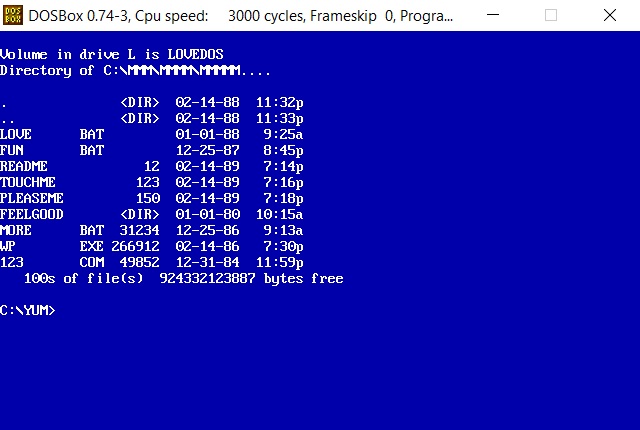
What follows is a kind of interface fiction. You interact with the game as you would a DOS prompt, if that DOS prompt desperately wanted to sleep with you. The parser is remarkably robust for a joke game. In response to unrecognized input, it will produce a comment from a well of suggestive innuendo that's deep enough to at least sometimes seem custom tailored. (Part of its repertoire includes mirroring what you typed back at you -- active listening! Hey, it worked for Eliza.) The parser also recognizes a variety of built-in MS-DOS commands and common installed software...
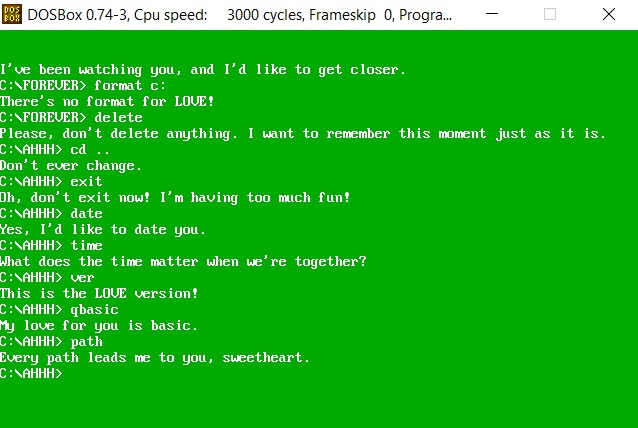
...indeed, quite a few.
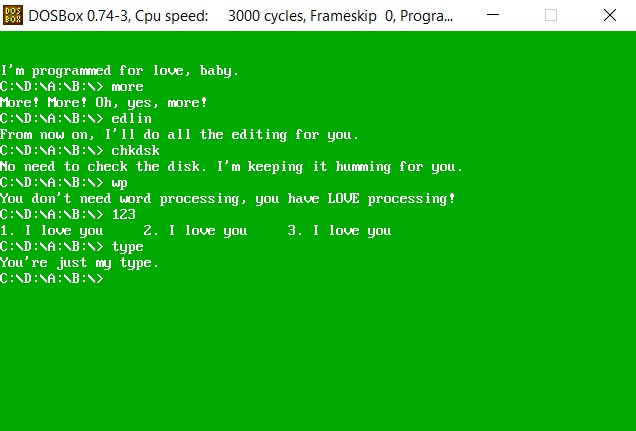
(I didn't reverse engineer the executable or anything, since it'd take more work than just tossing it into a hex editor and looking for strings, so there might be more valid commands than this.)
After you enter a few commands, LOVEDOS will either present you with the wall of climax seen above, spam you with hearts, or even make you a pretty picture!
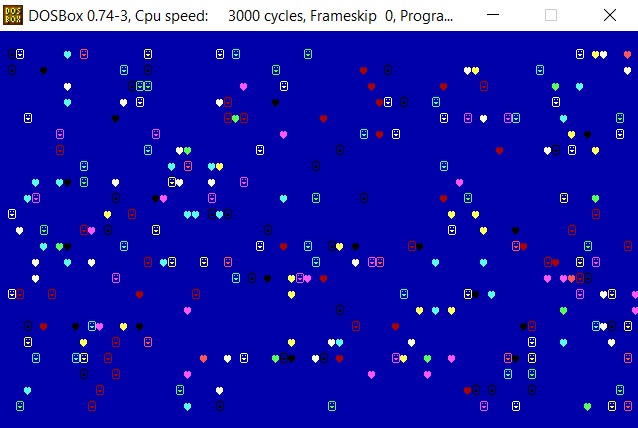
CREEPY STUFF STARTS HERE
In addition to DOS commands, LOVEDOS recognizes a number of conversational text adventure-style commands that you, a human, might think of saying to this thing:
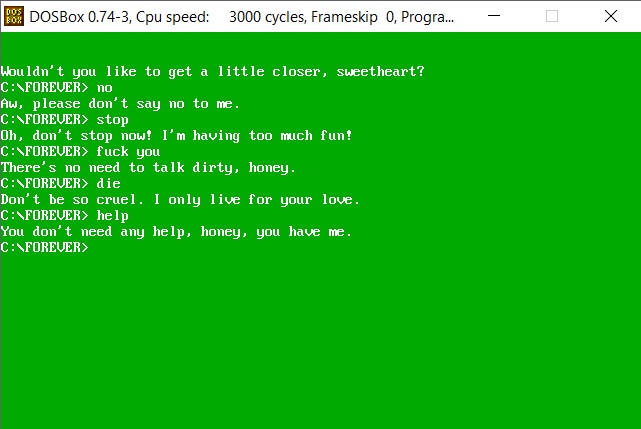
The game also responds to pressing various keys, such as Delete, Home, End, or the most suggestive of them all, Insert:
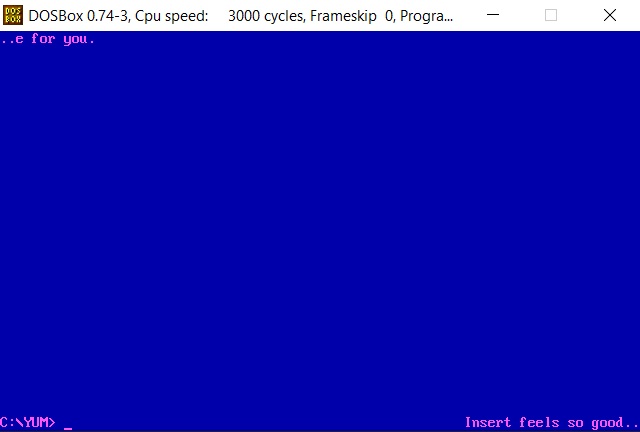
What happens if you press ESC?
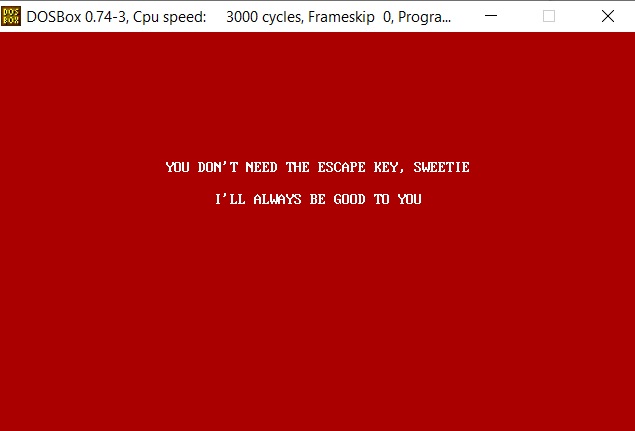
Oh.
This is the game's version of a jumpscare, and it definitely is that. The function keys produce the same hijacked command prompt and red screen ("MY ONLY FUNCTION IS TO LOVE YOU"). It's all very intense -- and even more intense today, thanks to a quirk of modern emulation, As you can tell by the screenshots, I'm running this under DOSBox, on a Windows machine. This produces some slight differences in behavior. Namely, if you press Ctrl-Alt-Delete (which existed at the time, but would likely have just rebooted the machine), you will see a visual effect that looks *even more* like something out of a creepypasta. If you told me the following screenshot was from a horror game on itch.io, I would absolutely believe you:
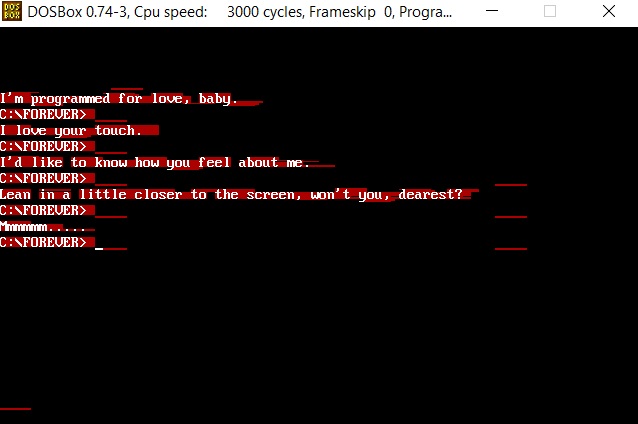
All this makes sense for an escape-the-room parser game -- there has to be a puzzle to solve to escape your environment, whether that be a mysterious room or a simulated shell. But, well, if you're pressing ESC or CTRL-ALT-DEL on an old computer, it's likely because you really want out -- perhaps out of a program installed on your machine without your knowledge. (That is, if anyone had this on their machine and wasn't already in on the joke.) Combine that with the depiction of an obsessive admirer who won't let you go and doesn't accept "no," and what you have is more than a little creepy, giving more than a little Doki Doki Literature Club. But I wouldn't write a long retrospective of an old shaeware game to cancel it. The vibe it exudes nowadays was almost definitely not intended, and to some people the exuded vibe was quite different. West made the game with the man who'd become her husband of 30+ years. We love a love story!
return to blog index, or return home